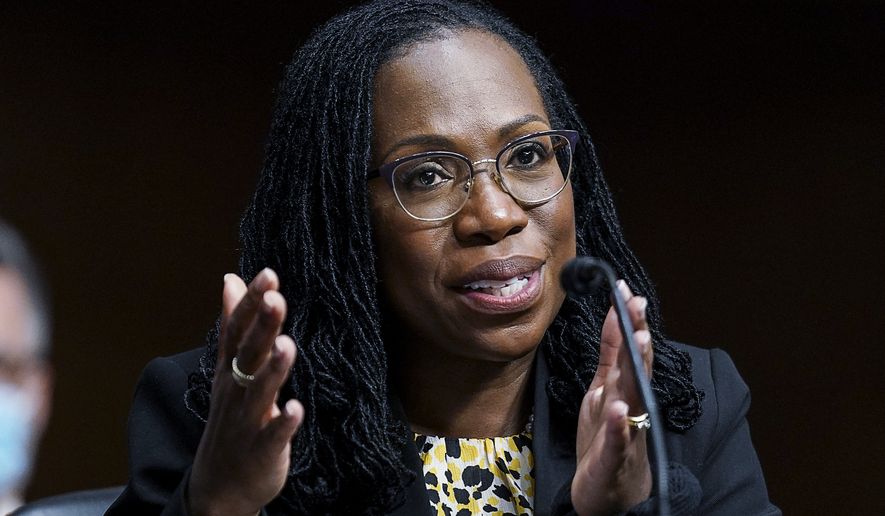President Biden has a deep bench of Black female legal scholars to choose from for a history-making Supreme Court pick, and his shortlist is replete with figures who will thrill the party’s racial justice and far-left activists.
Mr. Biden promised during the 2020 campaign that he’d appoint a Black woman to fill a vacancy on the court and Justice Stephen G. Breyer’s pending retirement gave him that chance.
The top two names on the list, court watchers say, are Judge Ketanji Brown Jackson, who was confirmed in June to the U.S. Court of Appeals, and California Supreme Court Justice Leondra Kruger.
“The money in Washington is heavily in favor of Jackson and Kruger as the leading contenders,” said Jonathan Turley, a constitutional law professor at George Washington University.
Other likely contenders for the lifetime appointment to the high court are J. Michelle Childs, a U.S. District Court judge in South Carolina; Sherrilyn Ifill, director of the NAACP Legal Defense and Educational Fund; Wilhelmina Wright, a U.S. District Judge in Minnesota; and Leslie Abrams Gardner, a U.S. District Court judge in Georgia.
Elliot Mincberg, a senior fellow at the liberal advocacy group People for the American Way, said not to count out any of them.
“Biden has the personal and professional knowledge and expertise to go outside the box because he was chair of the Senate Judiciary Committee,” he said.
All of these candidates are on the shortlist for good reasons.
Judge Childs has a major backer in House Majority Whip Rep. James E. Clyburn, a South Carolina Democrat and key Biden ally.
Mr. Biden nominated Judge Childs to the U.S. Court of Appeals for the District of Columbia Circuit, but her nomination remains pending. She spent a decade in private practice and as a South Carolina state trial judge.
Ms. Ifill, a civil rights lawyer, recently announced that she would step down from the NAACP Legal Defense and Education Fund. She has been active in voting rights and the criminal justice system.
Judge Gardner, the sister of voting activist Stacey Abrams, was appointed to the federal bench by President Obama in 2014. She also worked as a federal prosecutor in Atlanta.
Judge Wright is said to be a favorite of Sen. Amy Klobuchar, a Minnesota Democrat on the Judiciary Committee.
In Washington circles, however, Judge Jackson and Judge Kruger are considered to have some distinct advantages.
Judge Jackson, 51, has already been through the vetting process, including an interview with Mr. Biden.
She received high marks for handling herself during a Senate confirmation hearing last year. She was confirmed in a 53-44 vote with Republican Sens. Susan M. Collins of Maine, Lisa Murkowski of Alaska and Lindsey Graham of South Carolina voting in her favor.
Democratic Sens. Joe Manchin III of West Virginia and Kyrsten Sinema of Arizona, who have blocked several of Mr. Biden’s agenda items, also voted for her confirmation.
“Brown Jackson recently went through the confirmation process. That would minimize the surprises that would come during the [Supreme Court] confirmation. She also has the recent votes of senators to put wind in her sails,” Mr. Turley said.
Judge Jackson clerked for Justice Breyer and holds degrees from Harvard and Harvard Law School. She also served as an assistant federal public defender. Mr. Biden has appointed judges with backgrounds in community service.
Perhaps Judge Jackson’s most high-profile case was a 2019 decision in which she ordered White House counsel Don McGahn to testify in the impeachment inquiry against President Trump.
Judge Kruger, 45, is an associate justice on the Supreme Court of California. She has argued 12 cases before the Supreme Court as a member of the solicitor general’s office under Presidents George W. Bush and Obama.
A former clerk for Supreme Court Justice John Paul Stevens, she was appointed to the California Supreme Court in 2014 when she was 38.
During her time at the Justice Department, she twice won the Attorney General’s Award for Exceptional Service, the department’s highest award for employees.
Her most notable opinions on the California Supreme Court include holding that law enforcement could not search a woman’s purse without a warrant because she declined to turn over her driver’s license and upholding a law that requires law enforcement to collect DNA samples and fingerprints from anyone charged with or convicted of a felony offense.
Judge Kruger’s rulings aren’t as far left as Judge Jackson’s decisions. That could give her an edge to persuade a few of the court’s Republican-appointed judges to side with those appointed by Democrats.
The high court has a 6-3 conservative majority, which is not expected to change with Justice Breyer’s replacement.
“It does make a difference if you can pick a moderate that can make deals and actually get some victories for the left,” said Josh Blackman, a Supreme Court scholar at South Texas College of Law.
Curt Levey, president of the conservative-leaning Committee for Justice, said plenty of Black women are qualified for the court, but he said he is concerned about Mr. Biden’s focus on race and gender.
“We have too much identity politics right now. We don’t need more of it,” he said. “The more emphasis you put on finding the exact right identity group, the less emphasis you put on finding the right person.”
One intriguing candidate would be Vice President Kamala Harris. By nominating her, Mr. Biden could fulfill his campaign pledge and find a graceful way to remove her from the 2024 Democratic ticket.
Ms. Harris has low approval ratings, and dysfunction in her office has been reported.
White House press secretary Jen Psaki rejected the idea that Mr. Biden would select Ms. Harris.
“The president has every intention of running for reelection and running for reelection with Vice President Harris on the ticket as his partner,” she said.
• Jeff Mordock can be reached at jmordock@washingtontimes.com.




Please read our comment policy before commenting.